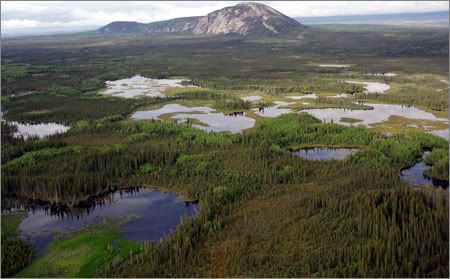
The boreal forest circles the northern hemisphere like a "green scarf"
Credit: Global Forest Watch
The boreal forest is back in the news again for its increasingly recognized ability to absorb and store massive amounts of carbon. In addition to being an enormous breeding region for migratory birds, boreal forests are vitally important in efforts to mitigate climate change. As the debate for how to reduce emissions and prepare for climate change grew over the last decade, one of the least-reported solutions, however, was the protection of global (and in particular, boreal) forests as both a carbon sink and greenhouse gas regulator.
As pointed out in this insightful article in The Telegraph (one of the UK’s largest papers), boreal forests are unique in the sense that they withdraw greenhouse gasses like carbon dioxide out of the atmosphere but also store this removed carbon in the soils and sediments for thousands of years. In fact, boreal forests are estimated to be the largest land-based storehouse for carbon in the world.
We conducted a report back in November of '09 summarizing the importance of boreal forests both in terms of carbon storage and as a critical intact habitat for species adapting to climate change. Find out more >
Industrial development and the logging of these forests can release much of the carbon they have been building up for millenia. This essentially means the more intact and healthy we keep our boreal forests, the longer and more effectively they will be able to act as a climate moderator. As the Telegraph article points out, several Canadian provinces have taken steps to protect large areas of boreal forest – in part to keep the carbon locked in the ground. These measures should be encouraged in other provinces and other countries, such as Russia (which was much of what the article discussed).

Wetlands are a large reason why boreal forests store so much carbon
Credit: Chad Delany, Ducks Unlimited
Nigel Roulet, a member of the International Boreal Conservation Science Panel, insightfully summarized the need to start protecting these remote forests now rather than later:
"The threats to the boreal forests don't seem significant right now," explains Nigel Roulet, a carbon cycle specialist at McGill University in Montreal. "But I'm convinced pressure will increase as the region gets warmer and it gets easier to operate there."
I mentioned in my last post a report that found boreal forests to be some of the most impacted forests in terms of net loss in the last decade. While still largely intact, this surely should put more urgency on governments to both protect large regions of boreal forest and properly manage regions currently unprotected. It’s one of the last global environmental issues we still have the opportunity to get right before it’s too late…

